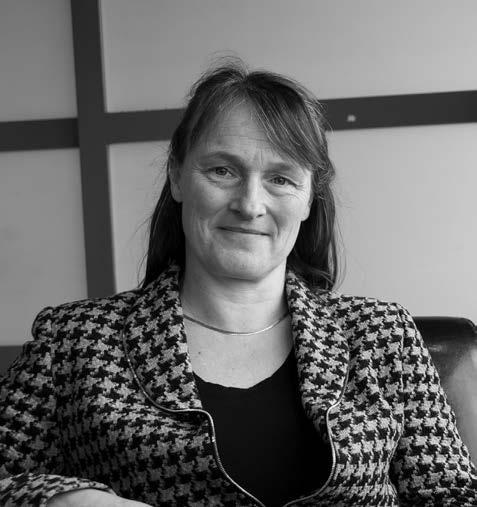
6 minute read
The food chain in transition
Towards more trust in safe products
A talk with Bart Jan Krouwel, Chairman of the core group for the Food Confidence Taskforce
There is increasing global concern about food safety and integrity. In recent years in our country there have also been various incidents in this area. These are reasons for the public sector and the business sector in the food and food chains to join forces under the motto ‘Trusting food is taking responsibility’. In 2013 the Food Confidence Taskforce was established. The aim was: to take joint responsibility for actions to increase confidence in safe food products. We talked with Bart Jan Krouwel, Chairman of the core group of this Taskforce.
What does trust mean?
You must be able to assume 100%, so completely ‘blindly’, that what you are eating is safe and that it has not been tampered with. And I don’t mean merely the end product but also the ingredients in it such as animal food. This gets to the core. It is not only about the final producer but the whole chain is involved. The question of whether the supplier’s product is safe is crucial with regard to the trust of the final producer and the consumer. That was the objective of this Taskforce: restoring trust in the production chain.
A lot of people think that the food they buy comes from a factory. So that no cow or any animal whatsoever is involved. When our grandchildren are here they think it is great fun to see whether the chickens have laid eggs again. Or they wonder about the large sprouts which are growing just like that in the garden and they would love to take them to school. In other words, the trust of the consumer has also something to do with knowledge of the food chain. That is why it is so important that food producers indicate in a completely transparent way what has been processed into their product, how it was produced and which quality criteria it complies with. That determines trust.
The core of the problem
In every sector, including the food sector, there are always entrepreneurs who are looking at the limits of what is allowed and even going beyond it. Why is that? Pure monetary gain. For instance the dioxin scandal with eggs that took place in Germany a couple of years ago comes to mind. The whole world was in turmoil. In the end it turned out that a producer processed all kinds of oils into his animal feed products which he could collect free of charge from garages. These were technical oils drained from cars or tractors, so not the required vegetable oils. This created more mass, a greater quantity. And it did not cost anything. This is obviously criminal behaviour whereby someone stops at nothing endangering food safety and even people’s lives.
The public sector would prefer to close off everything 100%. It aims at preventing these types of fraud cases and incidents. That never works completely. We often discussed this at length in the Taskforce. There will always be entrepreneurs, in any sector, who if ever they have the chance to cheat, will do this to benefit themselves. The point is that producers who are operating properly and who know what is happening in the sector, including where things are going wrong, often don’t have the courage to speak out. Factors such as competition considerations or even fear from being threatened or blackmailed might play a role in this connection. It is a ‘grey’ area which is difficult to get hold of. I think another cause is that there are too many quality certification systems. If as a consumer you go to the supermarket you will come across all kinds of quality marks, quality labels and trademarks. What can you actually still trust?
You see the public sector taking all kinds of measures and creating institutions in its endeavour to restore trust. But they can often get in each other’s way a lot. Take for instance the Netherlands Authority for Consumers and Markets. From the point of view of commercial competition it has to oversee that a lot is allowed or – rather – should be possible. The Taskforce was established after the incident with horse meat. But despite prosecution, such a company can start a business elsewhere in Europe almost without any problems. In those places other standards and rules apply. Malicious entrepreneurs will always find a way due to the differences existing between national and interna- tional legislation and regulations. All this precisely involves making good arrangements within the national but certainly also within the international chains. If you don’t do this, you put the cart before the horse.
Better information exchange
If we really want to take steps to restore trust in the area of food safety, a proper information exchange between the supervisory bodies and the business sector is of great importance. But even more important is the information exchange within government agencies and within the private sector, and the communication between those parties. This is a crucial point. Two examples illustrate this.
The Dutch Food and Consumer Product Safety Authority (Nederlandse Voedsel- en Warenautoriteit: ‘NVWA’) raids businesses and then discovers things which are not in accordance with the quality certification. But the same NVWA cannot pass on these findings due to privacy legislation. In the Taskforce this subject has regularly come up for discussion. It then appeared for instance that the tax authorities raided a business due to suspected tax evasion but found abuses there in the area of food safety and subsequently did not pass this on to the NVWA. This was because, as the respective tax officer said, this did not come under the responsibility of the tax authorities. This lack of information exchange can also be seen in the private sector. There competition considerations in particular play a decisive role, together with the fear of exchanging information apparently associated with it. Can you and do you want to pass on to colleagues information that is at your disposal? What does this then mean for the business and for the competitive position? It is important that the entire chain communicates with complete openness. If that is not the case, it will lead to people losing their trust in food safety.
From advice to action
Soon the final report of the Taskforce will be published. The big question is obviously what the public sector and the business sector are going to do with it. There will be a report but will it also actually be converted into action? Do we really achieve assurance of the safety of the chain? Or will the thinking be: there is a report and thereby the case has been rounded off? In my view we are still at the beginning of assuring safety in the food chain. Further steps are necessary. How do you get from advice to actual action and connection within the food provision chain?
In short: we can congratulate ourselves but how do we make the system watertight? The intentions are good, the arrangements are good, you are certified by an accepted system but gaps are left. It is not only about quality systems but also – and perhaps even much more – about information exchange. One of the most important arrangements which the Taskforce managed to generate is that we achieve improved information exchange. This has been laid down in the arrangements between the NVWA and the private parties, united in the Stichting Ketenborging foundation. This is positive. But the outcomes of the report of the Taskforce must be measured and evaluated at fixed moments. How many incidents took place after the final report of the Taskforce? I think this is a case in relation to which the Members of Parliament should question responsible cabinet ministers every year.
Major opportunities for improvement
Where are the opportunities for improvement, and what will we as the people notice in this area? Firstly you can expect fewer fraud cases to occur. There are sharp criteria for the quality certification systems but one condition is obviously that certification authorities operate properly. In those organisations the training and the associated quality of the employees play a decisive role. This means people should be able to trust the quality of certification authorities. In this connection the RvA fulfils a core function. Precisely bodies like these, in exactly the same way as for instance the Dutch Safety Board, are indispensable to the chain of quality assurance and for creating and maintaining trust in our society.
Bart Jan Krouwel is an independent supervisory director/supervisor, advisor and manager in the area of corporate social responsibility. In 2013 he was appointed as the chairman of the core group of the Food Confidence Taskforce. Previously he was for instance chairman of the Productschap Pluimvee & Eieren (Poultry and eggs marketing board), CSR Director at Rabobank Nederland and co-founder and first Director of Triodos Bank. In 2009 he was appointed an Officer in the Order of Oranje-Nassau due to his merits in the area of sustainability in the financial sector.





